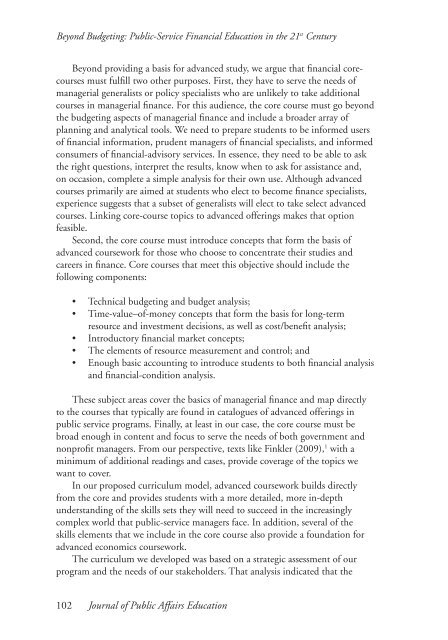Beyond Budgeting: Public-Service Financial Education in the 21st ...
Beyond Budgeting: Public-Service Financial Education in the 21st ...
Beyond Budgeting: Public-Service Financial Education in the 21st ...
You also want an ePaper? Increase the reach of your titles
YUMPU automatically turns print PDFs into web optimized ePapers that Google loves.
<strong>Beyond</strong> <strong>Budget<strong>in</strong>g</strong>: <strong>Public</strong>-<strong>Service</strong> <strong>F<strong>in</strong>ancial</strong> <strong>Education</strong> <strong>in</strong> <strong>the</strong> 21 st Century<br />
<strong>Beyond</strong> provid<strong>in</strong>g a basis for advanced study, we argue that f<strong>in</strong>ancial corecourses<br />
must fulfill two o<strong>the</strong>r purposes. First, <strong>the</strong>y have to serve <strong>the</strong> needs of<br />
managerial generalists or policy specialists who are unlikely to take additional<br />
courses <strong>in</strong> managerial f<strong>in</strong>ance. For this audience, <strong>the</strong> core course must go beyond<br />
<strong>the</strong> budget<strong>in</strong>g aspects of managerial f<strong>in</strong>ance and <strong>in</strong>clude a broader array of<br />
plann<strong>in</strong>g and analytical tools. We need to prepare students to be <strong>in</strong>formed users<br />
of f<strong>in</strong>ancial <strong>in</strong>formation, prudent managers of f<strong>in</strong>ancial specialists, and <strong>in</strong>formed<br />
consumers of f<strong>in</strong>ancial-advisory services. In essence, <strong>the</strong>y need to be able to ask<br />
<strong>the</strong> right questions, <strong>in</strong>terpret <strong>the</strong> results, know when to ask for assistance and,<br />
on occasion, complete a simple analysis for <strong>the</strong>ir own use. Although advanced<br />
courses primarily are aimed at students who elect to become f<strong>in</strong>ance specialists,<br />
experience suggests that a subset of generalists will elect to take select advanced<br />
courses. L<strong>in</strong>k<strong>in</strong>g core-course topics to advanced offer<strong>in</strong>gs makes that option<br />
feasible.<br />
Second, <strong>the</strong> core course must <strong>in</strong>troduce concepts that form <strong>the</strong> basis of<br />
advanced coursework for those who choose to concentrate <strong>the</strong>ir studies and<br />
careers <strong>in</strong> f<strong>in</strong>ance. Core courses that meet this objective should <strong>in</strong>clude <strong>the</strong><br />
follow<strong>in</strong>g components:<br />
• Technical budget<strong>in</strong>g and budget analysis;<br />
• Time-value–of-money concepts that form <strong>the</strong> basis for long-term<br />
resource and <strong>in</strong>vestment decisions, as well as cost/benefit analysis;<br />
• Introductory f<strong>in</strong>ancial market concepts;<br />
• The elements of resource measurement and control; and<br />
• Enough basic account<strong>in</strong>g to <strong>in</strong>troduce students to both f<strong>in</strong>ancial analysis<br />
and f<strong>in</strong>ancial-condition analysis.<br />
These subject areas cover <strong>the</strong> basics of managerial f<strong>in</strong>ance and map directly<br />
to <strong>the</strong> courses that typically are found <strong>in</strong> catalogues of advanced offer<strong>in</strong>gs <strong>in</strong><br />
public service programs. F<strong>in</strong>ally, at least <strong>in</strong> our case, <strong>the</strong> core course must be<br />
broad enough <strong>in</strong> content and focus to serve <strong>the</strong> needs of both government and<br />
nonprofit managers. From our perspective, texts like F<strong>in</strong>kler (2009), 1 with a<br />
m<strong>in</strong>imum of additional read<strong>in</strong>gs and cases, provide coverage of <strong>the</strong> topics we<br />
want to cover.<br />
In our proposed curriculum model, advanced coursework builds directly<br />
from <strong>the</strong> core and provides students with a more detailed, more <strong>in</strong>-depth<br />
understand<strong>in</strong>g of <strong>the</strong> skills sets <strong>the</strong>y will need to succeed <strong>in</strong> <strong>the</strong> <strong>in</strong>creas<strong>in</strong>gly<br />
complex world that public-service managers face. In addition, several of <strong>the</strong><br />
skills elements that we <strong>in</strong>clude <strong>in</strong> <strong>the</strong> core course also provide a foundation for<br />
advanced economics coursework.<br />
The curriculum we developed was based on a strategic assessment of our<br />
program and <strong>the</strong> needs of our stakeholders. That analysis <strong>in</strong>dicated that <strong>the</strong><br />
102 Journal of <strong>Public</strong> Affairs <strong>Education</strong>
















